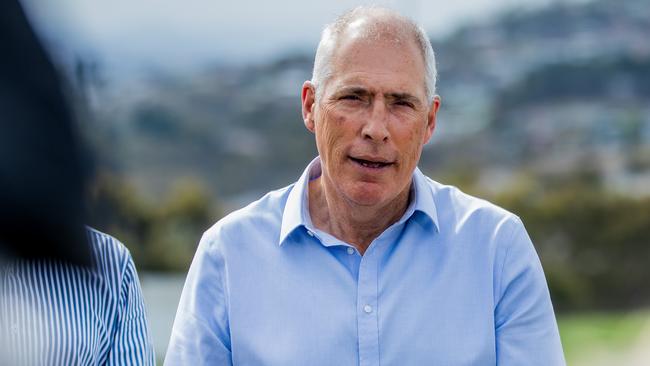Energy minister beats no-confidence motion over ‘lying’ claim
Labor has accused the state’s Energy Minister Nick Duigan of lying to parliament about power price increases faced by the state’s major industrial users — but its no-confidence motion failed.

Tasmania
Don't miss out on the headlines from Tasmania. Followed categories will be added to My News.
A Labor no-confidence motion that claimed Energy Minister Nick Duigan misled parliament about the power price increases faced by the state’s major industrial users was roundly rejected on Thursday.
Debate on the motion dominated state parliament before it was voted down 24-8 on a day the state’s peak business body pleaded with the government to intervene in what it described as an “energy crisis”.
Mr Duigan has repeatedly rejected claims that the state’s biggest power were facing a 20 per cent increase in transmission costs.
Labor leader Dean Winter claimed on April 3 that transmission costs paid by major users were going up 20 per cent this financial year and 10 per cent in the coming year.
“The minister’s behaviours towards the major industrials … have been shameful, and his performance in the parliament has been even worse, because what’s even worse than incompetence is dishonesty and telling lies,” he said on Thursday.
“This minister, I am convinced, has told lies to the public and told lies to the Parliament.”
The exact prices paid my big users are closely guarded secret, but Tasmanian Minerals, Manufacturing and Energy Council CEO Ray Mostogl told the ABC on Friday that the state’s four major industrial businesses – Bell Bay Aluminium, Norske Skog, Nyrstar and Liberty Bell Bay — had seen increases between 15 to 20 per cent in transmission costs per cent this financial year.
TasNetworks CEO Sean McGoldrick wrote to Mr Duigan — twice — on Thursday in a bid to clarify the matter.

“It is my understanding that representatives for major industrial businesses in Tasmania have been making sustained claims that directly connected Transmission Customers have had increases to their energy supply costs of by 20 per cent in this financial year,” he said on one of the letters.
“I am writing to confirm this is not the case.”
In the second, he said network charges for the state’s four biggest major industrials were increasing by 13.9 per cent this financial year and 10.6 per cent next financial year, a compound increase of around 25.2 per cent, a bit short of the total Labor claimed.
Deputy Premier Guy Barnett — a former energy minister himself — defended Mr Duigan.
“What this is about, this is a political stunt by state Labor on the last day of sitting prior to the Easter break, we have, we have work to do today, and you are trying to capture, obviously, the media’s attention to distract the government from the important work and the parliament’s important work,” he said.
TCCI CEO Michael Bailey said increasing energy costs were putting the future of major employers at risk.
“This is a threshold moment for the Tasmanian government,” he said.
“There is a question mark over the viability of many of Tasmania’s major industrials due to an increase in transmission costs.
“If the Tasmanian government doesn’t step in and act then the Tasmanian community will pay the price.
“There is an energy crisis that the Tasmanian government needs to address urgently.”



